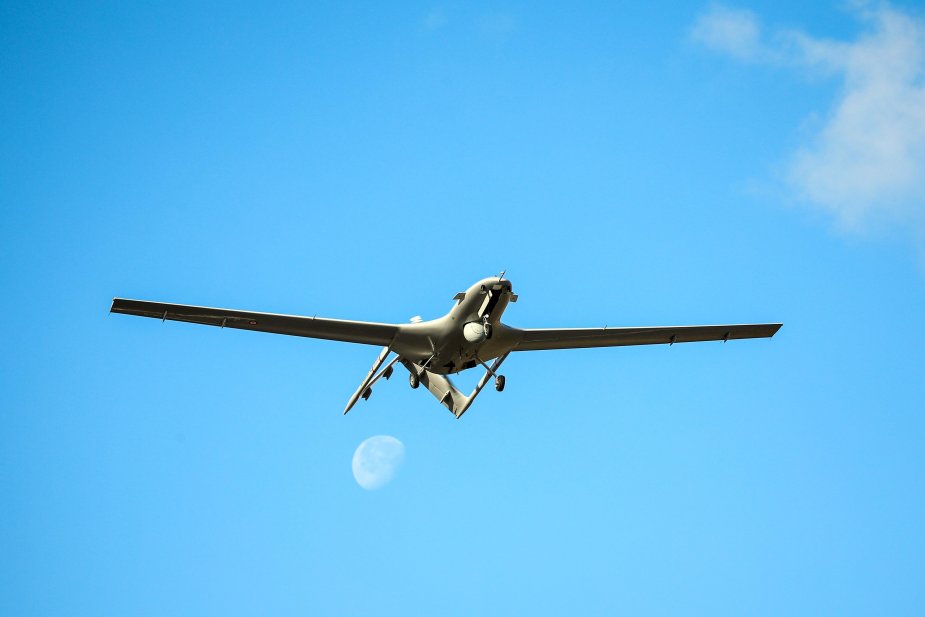Breaking news
First batch of TB2 Drones delivered to Maldives sparks regional tensions.
Following India's withdrawal request of its forces from its territory, the Maldives has announced the acquisition of the Bayraktar TB2 drone from Turkey to monitor its Exclusive Economic Zone (EEZ). The Maldivian government plans to deploy the Bayraktar TB2 drone, developed by the Turkish company Baykar Technology, to surveil its 900,000 square kilometer EEZ, enhancing its maritime surveillance capabilities.
Follow Air Recognition on Google News at this link
 he Maldivian government plans to deploy the Bayraktar TB2 drone, developed by the Turkish company Baykar Technology, to surveil its 900,000 square kilometer EEZ, enhancing its maritime surveillance capabilities (Picture source: BAYKAR technology )
he Maldivian government plans to deploy the Bayraktar TB2 drone, developed by the Turkish company Baykar Technology, to surveil its 900,000 square kilometer EEZ, enhancing its maritime surveillance capabilities (Picture source: BAYKAR technology )
The high-powered drone was reportedly acquired by the Maldivian government on March 3 and has been operational from the Maafaru International Airport in the Noonu Atoll. In addition to the Turkish drone, the Maldives government intends to purchase drones from China for similar purposes following the recent visit of their new president to China.
The acquisition of the Bayraktar TB2 drone by the Maldives from Turkey may face disapproval from India, given the strained relations between New Delhi and Ankara. India had stationed personnel in the Maldives to operate and maintain helicopters and light aircraft provided for search and rescue operations on the islands. Muizzu, perceived as pro-Chinese, assumed the presidency in November, campaigning on a platform that emphasized withdrawing from India.
New Delhi is making concerted efforts to maintain its influence in strategically crucial Maldives, located near the Indian Ocean, even as the island nation is courted by China with investments and economic aid. China is also seeking to improve its relations with the Maldives. Recently, the Maldivian government allowed the Chinese research vessel "Xiang Yang Hong 3" to dock in its ports for refueling. However, India is discontent with the presence of this research vessel, alleging that its primary function is to gather information and data for Chinese submarine operations, a claim vehemently contested by China.
In response to the Maldives' request to withdraw Indian forces and its close ties with China, India swiftly reinforced its naval base on Minicoy Island in the Lakshadweep Islands, not far from the Maldives. This new Indian naval base, named INS Jatayu, is equipped with radar facilities, warships, and the BrahMos guided missile system. It is intended to serve as a strategic military base for monitoring China's growing influence in the Indian Ocean and the movements of warships in this strategically vital region. In recent years, China has strengthened its ties with Indian Ocean littoral states, constructing both civilian and military port facilities.
The Bayraktar TB2, produced by the Turkish company Baykar, first entered service in 2014 and has since become a prominent fixture in unmanned aerial warfare. This versatile drone boasts advanced capabilities, including long-endurance flights of up to 27 hours and a maximum operational altitude of 24,000 feet. Equipped with precision-guided munitions, electro-optical and infrared sensors, and a laser designator, the TB2 is capable of conducting a wide range of missions, including surveillance, reconnaissance, and targeted strikes with pinpoint accuracy.
Since its introduction, the Bayraktar TB2 has garnered significant interest and adoption from various countries worldwide. Notable proliferators of the TB2 include Ukraine, Qatar, Azerbaijan, and most recently, the Maldives. Its success in multiple operational theaters underscores its effectiveness in modern warfare scenarios, positioning it as a key player in the global drone market and shaping the future of unmanned aerial systems.


























